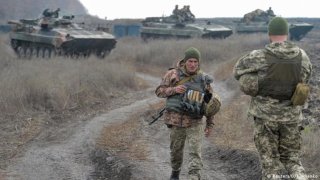NATO Concludes Baltic States Unable To Stop a Russian Invasion
"Destroyed in place," is how the authors of the NATO report put it.
Here's What You Need to Remember: The likelihood of such an invasion remains exceedingly low under present circumstances because the consequences of annexing the Baltic states, like potentially triggering World War III, far outweigh the small benefits.
Is NATO able to fend off a large-scale Russian invasion of the Baltic states? No, according to most experts.
A 2016 RAND Corporation report, “Reinforcing Deterrence on NATO’s Eastern Flank,” conducted a series of wargames simulating a Russian assault on the Baltic states. The report reached an “unambiguous” conclusion: Russia’s Western Military District (WMD) can steamroll NATO’s most vulnerable members at a moment’s notice, reaching the outskirts of Tallinn or Riga-- the capitals of Estonia and Latvia, respectively-- in sixty hours or less.
The report, authored by David Shlapak and Michael Johnson, attributed NATO’s crushing defeat to what is an entirely lopsided correlation of forces. The WMD (and to a lesser extent, Kaliningrad) units that would take part in the invasion not only vastly outnumber their NATO counterparts, but are qualitatively superior in most respects. The WMD has received a slew of modern hardware over the past decade, inducing the S-400 missile system, the new T-72B3M main battle tank (MBT), and BMP-3 infantry fighting vehicle (IFV’s).
The report argues that NATO’s light and under-equipped Baltic assets are little match for Russia’s motorized heavy divisions. The tactical disparity is so great, posit the authors, that NATO infantry wouldn’t even be able to retreat successfully from the Russian onslaught and would instead find themselves “destroyed in place.” Even when accounting for the effective use of NATO air power that could inflict noticeable losses on advancing Russian forces, NATO simply lacks the conventional means to resist a full-scale Russian invasion of the Baltic states.
The report further argues that this “Fait Accompli” presents western leaders and NATO high command with three unpalatable options:
1) a bloody and likely abortive counteroffensive to retake the Baltics;
2) to threaten nuclear retaliation, with all of the escalatory risks that entail;
3) or to “concede at least temporary defeat,” thrusting the future of the alliance into question.
The report ends with a proposed course of action by which NATO can avoid the Fait Accompli altogether: a military buildup of about “about seven brigades, including three heavy armored brigades—adequately supported by airpower, land-based fires, and other enablers on the ground and ready to fight at the onset of hostilities.” These forces are still not enough to defeat the Russian incursion outright but will deny Moscow a quick victory and impose severe losses on the invading army. The ensuing battle of attrition will favor the wealthier and more materially powerful west, establishing what the authors see as a sufficient deterrent against Russian aggression.
Five years later, the correlation of forces on NATO’s eastern flank has not drastically shifted. The Baltic states have gradually ramped up their defense spending and received a steady stream of US military aid, but these modest measures are being offset by Russia’s continued military buildup on its western outskirts and in its Central European enclave of Kaliningrad. A 2021 paper, published by the Swedish Research Agency, largely replicated the 2016 RAND report’s conclusion that Russia’s military can overwhelm the Baltic region in a matter of days.
But if the Baltics have really been so vulnerable for so many years, why is it that the Russians have yet to attack?
Experts have noted that the likelihood of such an invasion remains exceedingly low under present circumstances, in large part because capability does not imply intent. It is indisputably true that Russia can annex the Baltic states with negligible short-term costs, but the avalanche of medium to long-term military, economic, and political consequences-- up to and including an escalatory spiral that could trigger WWIII-- far outstrips any of the dubious, ill-defined benefits that could possibly come from such an endeavor.
Mark Episkopos is the new national security reporter for the National Interest.
This article is being republished due to reader interest.
Image: Reuters.

